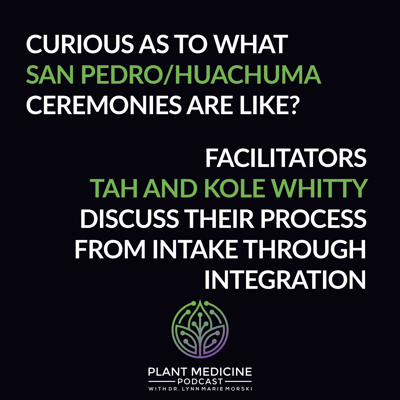Mescaline Practitioner Methods with Tah and Kole Whitty
- 68
- 06/01/2020

Summary
Tah Whitty spent 25 years as a nurse in emergency medicine, and Kole Whitty has spent 17 years educating professionals about life’s addictions. Together, they have 17 years of combined experience in various shamanic traditions, guiding performance-driven entrepreneurs.
In this week’s episode, Tah and Kole discuss how their paths led to facilitating huachuma (San Pedro) ceremonies. While they both were initially resistant to using plant medicine, they discovered how impactful huachuma ceremonies can be to resolve pent up trauma.
Tah and Cole describe huachuma as more gentle compared to other plant medicines, though the effects of the medicine can often be present for 10-12 hours. They also discuss the pre-journey intake process, the preparation and support that goes into a participant’s experience, and the post-care support to help integrate the experience into their healing journey.
In addition to explaining the huachuma ceremony, Tah and Cole talk about trauma and healing. They emphasize the importance of avoiding the Transformation TRAPP (Tirelessly Repeating A Painful Process) which can be harmful to an individual’s growth, and the importance of being in a state of relaxation to optimize healing.
In this week’s episode, Tah and Kole discuss how their paths led to facilitating huachuma (San Pedro) ceremonies. While they both were initially resistant to using plant medicine, they discovered how impactful huachuma ceremonies can be to resolve pent up trauma.
Tah and Cole describe huachuma as more gentle compared to other plant medicines, though the effects of the medicine can often be present for 10-12 hours. They also discuss the pre-journey intake process, the preparation and support that goes into a participant’s experience, and the post-care support to help integrate the experience into their healing journey.
In addition to explaining the huachuma ceremony, Tah and Cole talk about trauma and healing. They emphasize the importance of avoiding the Transformation TRAPP (Tirelessly Repeating A Painful Process) which can be harmful to an individual’s growth, and the importance of being in a state of relaxation to optimize healing.
In This Episode
• What drew both Tah and Kole to working with huachuma ceremonies
• The origin of the terms huachuma and San Pedro.
• Some common experiences during a huachuma ceremony.
• The preparation and support facilitators provide before and during a huachuma ceremony, and the necessity of follow up support.
• The importance of relaxation and the use of TRE (Tension and Trauma Release Exercise) to help the body relax at the beginning of their ceremonies.
• How modern treatments promote “Transformation TRAPP.” and prevent true healing.
Quotes
“When your nervous system is relaxed, you can actually get to the deeper space that you need to get to, and that’s where healing takes place the most.” [5:03]
“You are not controlling the [Mescaline]experience. You are co-creating the experience.” [13:03]
“The trauma response, physiologically, is your response to an activity. Trauma is not what happens to you, it is how your body and your organism responds.” [27:56]
“What does it feel like to be free of the conditioning, of the expectations, of the trauma, and drama? It doesn’t mean you stop feeling, it means it stops being so much weight on your wings.” [42:06]
“We have had countless people come to us and to work with us, and they’re like ‘I’ve got trauma that is holding me back!’ No, what is holding them back is that they are not allowing themselves to have fun.” [43:16]
“You are not controlling the [Mescaline]experience. You are co-creating the experience.” [13:03]
“The trauma response, physiologically, is your response to an activity. Trauma is not what happens to you, it is how your body and your organism responds.” [27:56]
“What does it feel like to be free of the conditioning, of the expectations, of the trauma, and drama? It doesn’t mean you stop feeling, it means it stops being so much weight on your wings.” [42:06]
“We have had countless people come to us and to work with us, and they’re like ‘I’ve got trauma that is holding me back!’ No, what is holding them back is that they are not allowing themselves to have fun.” [43:16]
Links
* The Psychedelic Medicine Podcast has allowed the Psychedelic Medicine Association to post episodes as an educational resource, and in return the PMA is hosting the podcast show notes.


